 New York, Oct 18: Prime Minister Manmohan Singh cannot be kept out of the CBI probe into the controversial coal block allocation as he was the "competent authority" when the decision was taken, senior BJP leader Arun Jaitley said today.
New York, Oct 18: Prime Minister Manmohan Singh cannot be kept out of the CBI probe into the controversial coal block allocation as he was the "competent authority" when the decision was taken, senior BJP leader Arun Jaitley said today.
Naming industrialist Kumar Mangalam Birla and former coal secretary P C Parakh by the CBI in its FIR sent a "very, very adverse" signal that investors and civil servants will face investigation for irregularities, while the "competent authority" in the case, the Prime Minister who held the coal portfolio, "will go scot-free", Jaitley said.
He said successive corruption scandals like the spectrum and coal blocks allocation are adding to the "disillusionment" towards the UPA government.
"This (coal block allocation) case is going to send a very, very adverse signal to both international and domestic investors," Jaitley told PTI here.
The Leader of the Opposition in Rajya Sabha said it defied logic that a secretary to the government who recommends a coal block should be made an accused in an FIR filed by the CBI but the minister who sanctions the blocks should be out of it.
"The competent authority was the minister, the minister in this case happened to be the Prime Minister," he said. Jaitley said Parakh was only a "recommending authority" but has been named as an accused in the FIR. "The automatic corollary of this has to be that the minister in charge, who was the Prime Minister, cannot be kept out. He is the competent authority."
The FIR has named Parakh and Birla for criminal conspiracy and under provisions of the Prevention of Corruption Act in the allocation of two coal blocks in Odisha in 2005.Jaitley described Birla as "one of the doyens of the industry" and Parakh as an "an honest civil servant" who as a "dissenter" in the coal bloc allocation had recommended auction of coal.
"This case sends three signals. The investor is being told that if you invest in India, years later your projects and allocations can be reviewed by the investigating agencies and the head of your organisation will face criminal investigation.
"The politician is being told that the civil servant will be liable and the competent authority, who is the politician, will go scot free."
Jaitley added that the treatment meted out to Parakh is a warning to bureaucrats that "even the most honest civil servants will be investigated." The "net effect" will be that apart from foreign investments drying up, even domestic investors "will now be compelled to go outside." "This sends a very bad signal to investment. If honest civil servants are going to be squeezed to save the politicians, bureaucrats will stop making honest recommendations," he said.







Comments
Add new comment